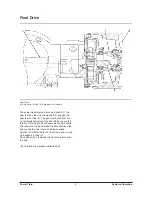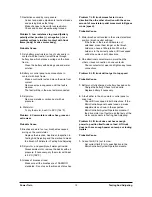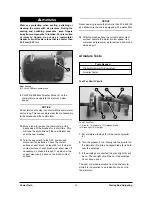
Power Train
Testing And Adjusting
Problem 4: Sparks at the commutator and/or
rapid brush wear.
Probable Cause:
1.
Worn brushes:
Make a replacement of the brushes. See New
Brush Installation And Brush Inspection in
Testing And Adjusting.
2.
Overheating (too much heat) of the traction motor:
Check for an overload motor or a motor with
defects. See Armature Commutator Inspection
in Testing And Adjusting.
Decrease the current limit (C/L) adjustments if
set too high. See the MicroController System
Operation module.
Test the plugging rate, if set too short it will
cause arcing and wear at the brushes.
The duty cycle is too heavy, change the duty
cycle.
3.
Defective drive motor:
See Armature Commutator Inspection in Testing
And Adjusting.
a.
Commutator bars burnt in two or more positions at
180¡ apart because:
(1) Armature bars open.
Make a replacement of the armature.
(2) Motor was stalled against a heavy load while
power discharged and caused the two bars, in
contact with the brushes, to burn.
NOTICE
Too heavy a load can stall the motor, and result in a
failure to the drive motor.
(3) Short circuit in the armature.
See Armature Tests in Testing And Adjusting.
(4) Armature not in balance, out of round, off center
or with high commutator bars. This causes the
brushes to bounce (move up and down).
Make sure the diameter is the same all the way
around and is in center line with the shaft. See
Specifications.
b.
Dirty motor that has a metallic or carbon dust. this
dust is a conductor which causes electrical shorts,
increase amp draw and decrease drive motor
output:
Remove any dirt with air pressure.
c.
Brush movement causes arcing and brush wear:
Check the brush springs for cracks, and
overheat signs (blue).
Compare spring force with a new brush spring.
Check the brush holder for oversize (larger size
than for brush).
Replace the brush spring if necessary.
d.
Loose brush leads or motor bus bar connections.
Loose cable connections at motor terminals.
Results are:
(1) High resistance and heating.
(2) Faster brush wear.
Check brushes for tight-connections.
Replace the brushes if leads are loose in
brush material. Check all cable and wire
connections for tightness.
e.
Wrong grade of brushes installed that are not
adaptable to the motor:
Make sure all the brushes are of DAEWOO
standards. Do not use other brands of brushes.
f.
Possibly heavy working condition that causes too
much motor heat and rapid brush wear:
Make a replacement of the brushes and make
sure the brushes are seated. See New Brush
Installation and Brush Inspection in Testing And
Adjusting.
Check the brush springs for the correct
installation and for the correct spring usage. Too
strong a spring rate will increase amperage
draw and brush wear rate.
Prevent operation in stall condition. Excessive
(too much) duty cycle which increases motor
temperatures and rapid brush wear.
4.
Overload of the drive motor such as: towing loads,
constant ramp operation, chiseling (hydraulic
actions that are not practical) loads and dragging
(pull or push loads on the ground) loads:
Operator training for better working practices.
Add an auxiliary cooling to the drive motors.
5.
Current limit (C/L) set too high that causes too
much current consumption through motors in the
transistor range:
Decrease the current limit (C/L) adjustment to
the correct setting, see the MicroController
System Operation module.
6.
Drive motor, armature or field windings have a
defect that results in high current draw at low
torque output:
See Armature Tests and Field Coil and Terminal
Tests in Testing And Adjusting.
11



























